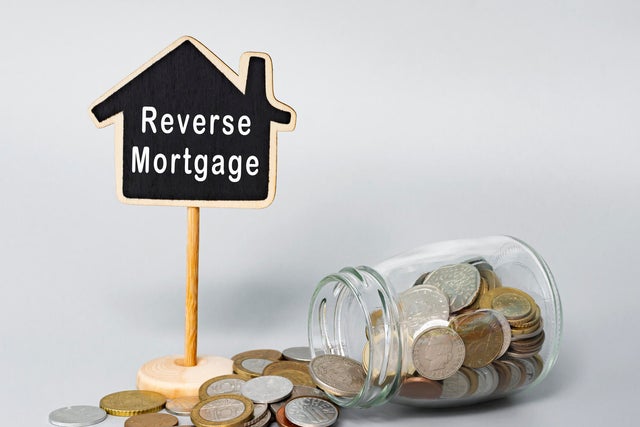What happens if you can't pay a reverse mortgage? 3 things to know
Reverse mortgages, which allow homeowners aged 62 and older to convert part of their home equity into cash without having to make monthly mortgage payments, have become increasingly popular among seniors looking to borrow money during retirement. About 23,900 reverse mortgage loans have already been originated for fiscal year 2025 (which began on October 1, 2024, and ends September 30, 2025), according to the National Reverse Mortgage Lenders Association. That represents billions in loan volume and a significant amount of debt for the seniors utilizing this tool.
But while reverse mortgages allow seniors to borrow without adding to their monthly financial burdens, the reality is that this option isn't completely payment-free. Borrowers must continue paying their property taxes, homeowners insurance and maintenance costs to keep their homes in good condition, for example, and the loan still has to be repaid in full when the borrower moves out of the home or dies. But when economic hardship strikes or unexpected expenses arise, even these seemingly manageable costs can become overwhelming.
The consequences of failing to meet reverse mortgage obligations can be severe and swift. Unlike traditional mortgages, reverse mortgage defaults can trigger quick action from lenders. That's why understanding what happens when you can't fulfill your reverse mortgage responsibilities is crucial for anyone considering or currently using this financial tool.
Learn more about the reverse mortgage loan options available to you here.
What happens if you can't pay a reverse mortgage?
When you can't meet your reverse mortgage obligations — whether that's property taxes, insurance premiums or home maintenance requirements — your lender doesn't just send you a late notice and move on. The consequences are more immediate and potentially devastating than many borrowers realize.
Here are three critical things that can happen when you default on your reverse mortgage responsibilities.
Your loan becomes immediately due and payable
The most immediate consequence of defaulting on reverse mortgage obligations is that your entire loan balance becomes due right away. Unlike traditional mortgages, where lenders might work with you through forbearance or modification programs, reverse mortgage contracts typically include acceleration clauses that allow lenders to demand full repayment immediately upon default.
This means if you owe $2,000 in back property taxes, your lender can suddenly demand repayment of your entire loan balance, which might be $150,000 or more. You'll typically receive a formal notice giving you 30 to 60 days to cure the default by paying what you owe, but if you can't come up with the money, the full loan amount becomes payable. For most seniors on fixed incomes, paying off the entire reverse mortgage balance isn't financially feasible, which leads to the next serious consequence.
Compare your reverse mortgage options and find the right fit today.
Foreclosure proceedings begin quickly
When you can't pay the full loan balance after receiving a demand letter, your lender will likely initiate foreclosure proceedings. Reverse mortgage foreclosures often move faster than traditional mortgage foreclosures because there's typically no opportunity for loan modification or payment arrangements that might buy you time. That said, the Federal Housing Administration, which insures Home Equity Conversion Mortgages (HECMs), requires lenders to follow a strict process before removing homeowners.
Still, for seniors who rely on a reverse mortgage for retirement income, this process can be particularly stressful. Facing the risk of losing the home you've lived in for decades can have emotional and financial ramifications. That's why experts recommend maintaining an emergency fund or exploring other financial resources, like downsizing or selling the property voluntarily, before foreclosure becomes the only option.
Your credit score may be impacted
While reverse mortgages don't require monthly payments, any missed obligations, such as property taxes or insurance, can still lead to liens or judgments against your home. And, if these issues are reported to credit bureaus, it can negatively impact your credit score, making it more difficult to secure other types of credit or financing in the future.
So, even though reverse mortgage debt itself doesn't appear on your credit report, any associated financial missteps can. That's why staying proactive and contacting your lender if you foresee trouble paying taxes or insurance can help prevent long-term damage to your financial standing.
Why reverse mortgages can still be a smart choice for seniors
Despite the risks, a reverse mortgage can still be a valuable tool for retirees when used appropriately. For homeowners who can comfortably afford ongoing property taxes, insurance and maintenance costs, a reverse mortgage provides access to home equity without monthly payments. This can be particularly beneficial for retirees who are house-rich but cash-poor, allowing them to supplement their income, pay for healthcare expenses or handle unexpected costs without selling their homes or taking on additional monthly debt obligations.
Reverse mortgages can also offer the types of financial flexibility that many other financing options can't. For example, borrowers can choose to receive funds as a lump sum, monthly payments or a line of credit, depending on their needs. Plus, recent improvements in reverse mortgage programs, including financial assessment requirements and mandatory counseling, have made these loans safer than earlier versions and help ensure borrowers understand their obligations before proceeding.
The bottom line
Reverse mortgages can be a valuable tool for retirees looking to access home equity without monthly payments, but they come with responsibilities that must be taken seriously. Failing to pay property taxes, insurance, or maintain your home can trigger a loan demand, foreclosure or damage to your credit. So, if you're struggling to meet your reverse mortgage obligations, don't wait until you're in default to take action. Contact a HUD-approved housing counselor now to explore your options, which might include payment plans, assistance programs or strategies to avoid foreclosure. Being proactive about financial difficulties is always better than trying to recover from default after the damage is already done.
